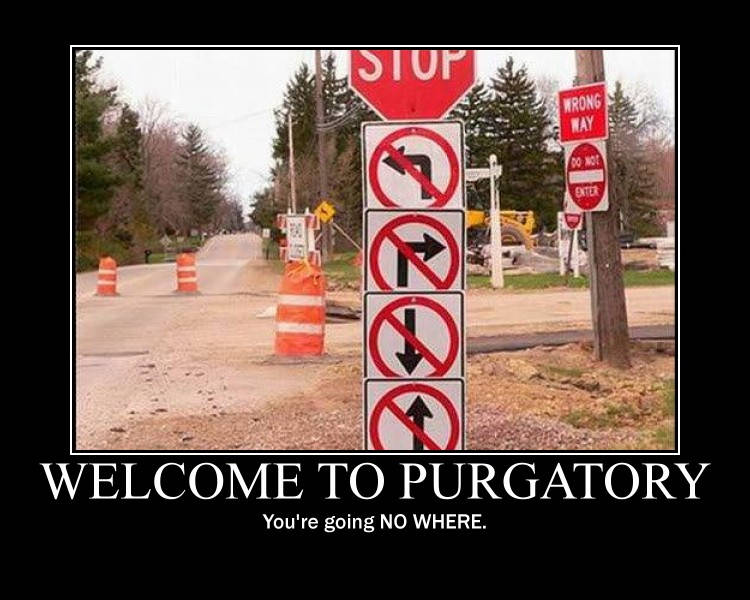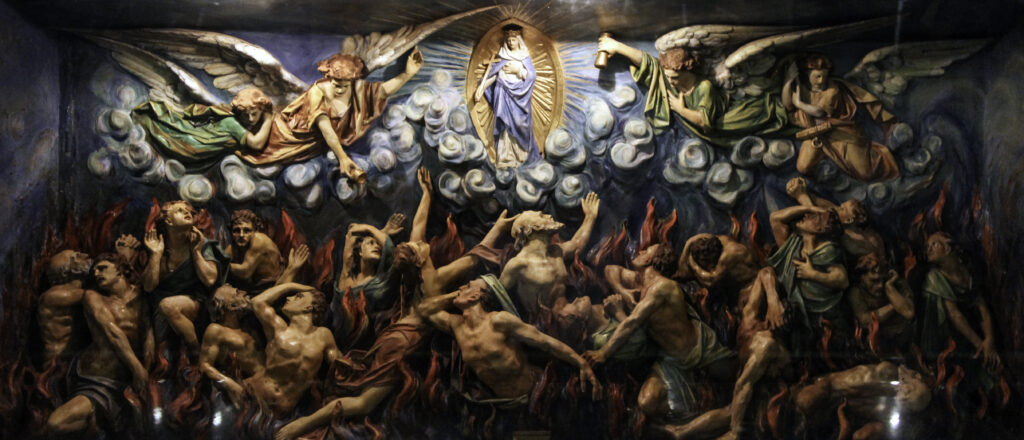 Image: Kurt Hunter, https://www.deviantart.com/kryt-hunter/art/Purgatory-Demotivator-201540716
Image: Kurt Hunter, https://www.deviantart.com/kryt-hunter/art/Purgatory-Demotivator-201540716
by Dr. Christine Wood, Director, Office of Evangelisation & Catechesis, Archdiocese of Hobart
Take a look on the internet and you’ll find some amusing memes about purgatory, like “If there’s a ‘heavens no’ and a ‘hell yes’, then why isn’t there a ‘purgatory maybe’?” Personally, I loved the image of the roadwork signs shown above. I think this meme summarises well the common misconception of the Catholic doctrine on purgatory.
Many people both aim for purgatory (not heaven) and assume they will be there ‘forever.’ But this is neither an attractive destination to set our hearts on, nor is it a correct understanding of the Church’s teaching about purgatory.
The month of November is dedicated to praying for the ‘faithful departed’ that they may be loosed from their sins. These faithful departed ones are known as the ‘holy souls’ in purgatory.
If you’re wondering if Catholics still believe in purgatory just take a look at the prayers of the Mass. In the Eucharistic prayers we pray for the purification of these holy souls that they may be admitted into God’s heavenly kingdom:
Eucharistic Prayer I: “Remember also, Lord, your servants N. and N., who have gone before us with the sign of faith and rest in the sleep of peace. Grant them, O Lord, we pray, and all who sleep in Christ, a place of refreshment, light and peace.”
Eucharistic Prayer II: “Remember also our brothers and sisters who have fallen asleep in the hope of the resurrection, and all who have died in your mercy: welcome them into the light of your face.”
Eucharistic Prayer III: “To our departed brothers and sisters and to all who were pleasing to you at their passing from this life, give kind admittance to our kingdom. There we hope to enjoy for ever the fulness of your glory through Christ our Lord, through whom you bestow on the world all that is good.”
The Catholic doctrine of purgatory is based on a number of Scriptures. For instance, in the Book of Revelation, John has a vision of the heavenly city and he writes that “nothing unclean shall enter it” (Rev 21:27). For John, this uncleanness refers to sin or unrighteousness. All sin and its effects must be removed for us to enter God’s heavenly presence.
So you might be thinking, “Well that’s good for those who are saints at their death, but what about the rest of us who are still struggling with sin and love God? Where do we go after death?” There’s a lot to unpack here about justification, sanctification, and salvation.
First, it is sin that separates us from God; but when we are baptised into Christ (Gal 3:26), we are reconciled to God. St Paul explains that “if anyone is in Christ he is a new creation…. All this is from God, who through Christ reconciled us to himself … that is, God was in Christ reconciling the world to himself ” (2 Cor 5:17-19). God bestows his saving grace upon us through baptism and faith.
Second, the bible teaches that when we sin personally we incur both guilt and a debt to God. This debt is sometimes called “temporal punishment due to sin.” One translation of the Lord’s prayer includes, “Forgive us our debts as we forgive those indebted to us.”
St Paul speaks about the purification on the day of judgment (i.e. the Day of the Lord). He says that, “If any one builds on the foundation with gold, silver, precious stones, wood, hay, stubble—each man’s work will become manifest; for the Day will disclose it, because it will be revealed with fire, and the fire will test what sort of work each one has done. If the work which any man has built on the foundation survives, he will receive a reward. If any man’s work is burned up, he will suffer loss, though he himself will be saved, but only as through fire” (1 Cor 3:10-15). Traditionally, the Church has understood this as part of the background for her understanding of the final purification that occurs in purgatory, although it would also include spiritual purification that occur in this life. Things that will be “burned up” include our inclinations to sinful pleasures, our grudges, and moral imperfections.
 Image: Fr Lawrence Lew, O.P., Flickr, CC BY-NC-ND 2.0
Image: Fr Lawrence Lew, O.P., Flickr, CC BY-NC-ND 2.0
When we confess our sins and repent we are reconciled to God through his grace, which removes our guilt. However, often our debt is not fully cancelled for various reasons. Sometimes we don’t repent for ideal reasons. We might do so simply to avoid God’s justice, but not out of love for him or our neighbour. Sometimes we repent but still harbour a grudge against someone, or still haven’t fully broken a sinful habit. We are weighed down by these inclinations to sin which is a form of debt, or a burden we still carry. We are not entirely free. We may love God again, but we don’t yet love him with pure hearts. Complete purification is an ongoing process.
To bring home this point, Jesus uses the image of a debtors’ prison in the parable of unforgiving servant. Jesus tells that a lord forgives his servant a great debt, but this servant then goes off to oppress those who are in debt to him. He doesn’t pass on the grace of forgiveness to others. So his lord hands him over to his jailers until he pays all of his debts (Matt 18:34). Jesus says to us, “So also my heavenly Father will do to every one of you, if you do not forgive your brother from your heart” (Matt 18:35).
Third, nothing impure can enter into God’s presence. If the purification of our hearts is incomplete in this life, as long as we still have faith and love of God when we die, we are saved but are still in need of purification. The full debt must be paid; the burden lifted. In his immense mercy, God provides for a final purification for souls in such a moral state. This purification occurs in purgatory.
Purgatory is a place of love and suffering. The souls there love God and one another. They suffer as they let go of what holds them back from complete union with God. It’s a good suffering though because these souls yearn for union with God and heavenly bliss.
Scripture bears witness to the Jewish belief that prayers for the dead can hasten the purification of these souls from sin: “It is therefore a holy and wholesome thought to pray for the dead, that they may be loosed from sins” (2 Macc 12:46). Continuing this faith practice, out of love we too implore God to show further mercy on these souls so that their purification might be swift and they can be elevated to the glory of heavenly beatitude.
So when we pray for the holy souls in purgatory – the faithful departed who have fallen asleep in Christ – we are not praying for those who are already enjoying heaven, for they have no need of our prayers. Neither are we praying for any souls who have chosen to separate themselves from God for ever in hell, for our prayers will be of no avail to them. We pray only for those in purgatory. And rightly do we say, “May they rest in peace.”
Can we go straight to heaven? Yes, it is possible through the grace of God. We are called to be saints and God offers abundant grace to be completely sanctified in this life. Let’s then strive to cooperate with the grace of our Lord Jesus. And let’s pray for the holy souls in purgatory this November.
Dr. Christine Wood
Director, Office of Evangelisation & Catechesis
Archdiocese of Hobart
